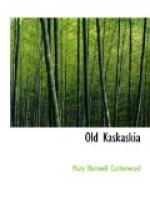He admired the seat where his seignior lived in comfort and great hospitality, but all the crowds pressing to Pierre Menard’s house seemed to him to have less wisdom than the single man who met and passed them and crossed the bridge into Kaskaskia. The vesper bell rung, breaking its music in echoes against the sandstone bosom of the bluff. Red splendors faded from the sky, leaving a pearl-gray bank heaped over the farther river. Still Jean watched Kaskaskia.
“But the glory remains when the light fades away,”
he sung to himself. He had caught the line from some English boatmen.
“Ye dog, ye dog, where are you, ye dog?” called a voice from the woods behind him.
“Here, grandfather,” answered Jean, starting like a whipped dog. He took his red cap from under his arm, sighing, and slouched away from the bluff edge, the coarse homespun which he wore revealing knots and joints in his work-hardened frame.
“Ye dog, am I to have my supper to-night?”
“Yes, grandfather.”
But Jean took one more look at the capital of his love, which he had never entered, and for which he was unceasingly homesick. The governor’s carriage dashed along the road beneath him, with a military escort from Fort Chartres. He felt no envy of such state. He would have used the carriage to cross the bridge.
“If I but lived in Kaskaskia!” whispered Jean.
The man on horseback, who met and passed the ball-goers, rode through Kaskaskia’s twinkling streets in the pleasant glow of twilight. Trade had not reached its day’s end. The crack of long whips could be heard, flourished over oxen yoked by the horns, or three or four ponies hitched tandem, all driven without reins, and drawing huge bales of merchandise. Few of the houses were more than one story high, but they had a sumptuous spread, each in its own square of lawn, orchard, and garden. They were built of stone, or of timbers filled in with stone and mortar.
The rider turned several corners, and stopped in front of a small house which displayed the wares of a penny-trader in its window.
From the open one of the two front doors a black boy came directly out to take the bridle; and behind him skipped a wiry shaven person, whose sleek crown was partly covered by a Madras handkerchief, the common headgear of humble Kaskaskians. His feet clogged their lightness with a pair of the wooden shoes manufactured for slaves. A sleeved blanket, made with a hood which lay back on his shoulders, almost covered him, and was girdled at the waist by a knotted cord.
“Here I am again, Father Baby,” hailed the rider, alighting.
“Welcome home, doctor. What news from Fort Chartres?”
“No news. My friend the surgeon is doing well. He need not have sent for me; but your carving doctor is a great coward when it comes to physicking himself.”




